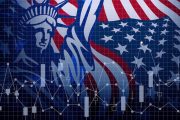
Public utterances of the term “Bidenomics” have all but disappeared from Joe Biden, his fellow Democrats, and their sycophants in the media. The impacts of the ill-conceived plan to “restore” the American economy following the plandemic continue to cost the American consumer, taxpayer, and voter — and dearly. The mantra of “don’t believe your eyes or your checkbook” but instead believe that the economy is “doing really really good” was always a tough sell.
Axios was the first to record the sharp turn away from using the fraudulent term in March, and Issues & Insights confirmed it shortly thereafter. Said Axios back in March: “’Bidenomics’ mentions by Biden, Democrats in Congress and others in the party have fallen off a table. It’s … an acknowledgement that the White House’s messaging effort was falling flat with many voters.”
It’s no wonder. Under Bidenomics Keynesian socialism was in full throat, with government spending soaring, taxes rising, and massive new regulations punishing small businesses, all of which are leading to “stagflation,” now a synonym for “Bidenomics.”
Stagflation stands for economic stagnation coupled with inflation, and here are the numbers to prove it
- Six out of every 10 American workers are living paycheck to paycheck;
- Most workers couldn’t handle a $400 “emergency”;
- Twenty million Americans are behind on their utility bills;
- Their credit card debt has exploded, exceeding $1.1 trillion;
- Defaults on credit card debt have increased in each of the last seven quarters;
- Car-loan delinquencies are soaring;
- It now takes $120 to purchase today what cost only $100 in January 2020; and
- The economy has lost 1.9 million full-time jobs in just the last three months.
According to the U.S. Bureau of Economic Analysis (BEA), the gross domestic product (GDP), a measure of the output of the nation’s economy, dropped from an annual growth rate of 5 percent in the third quarter of 2023, to 3.4 percent in the fourth quarter, to just 1.6 percent in the first quarter of 2024.
Danielle DiMartino Booth, chief economic strategist of QI Research, has declared that the U.S. economy is already in a downturn, noting that layoffs and unemployment are moving higher, with totals rising to 1.7 million in February. Economist David Rosenberg expects the unemployment rate, which rose from 3.7 percent to 3.9 percent in the latest report from the Bureau of Labor Statistics, to increase to 5 percent.
Booth blamed Bidenomics for the coming stagflation: “Right now, the public sector is sucking the life out of the private sector.”
And rather than declining, as the Biden administration has been touting, inflation is on the rise. The PCE (personal consumption expenditures’ price index favored by the Federal Reserve) jumped 2.8 percent, higher than anticipated, making last month the third straight in which prices went up faster than expected.
In other words, inflation has been accelerating during the same months that the economy was sagging. That’s “stagflation.”
The New American accurately defined Bidenomics: “Taking money from those who earned it and giving it, under the guise of ‘building [the economy] from the bottom up and the middle out,’ to others who didn’t earn it.”
Worse, much of that enormous $2 trillion boondoggle was deliberately misallocated to promote the “green” agenda: supporting losing economic policies and excoriating traditional energy development through excess regulation and financial disincentives. Left-leaning Bloomberg got it right: Bidenomics is “government intervention in the economy to give an advantage to certain industries, companies, or goals, over others.”
The failure of Bidenomics continues to show up in the polls. Biden’s overall job-approval rating recently touched a record low of 35 percent in several polls, while dissatisfaction has approached 60 percent. On the economy the numbers are even worse — 37-percent approval in three recent polls, and 64-percent disapproval in four recent polls.
The term “Bidenomics” may have disappeared from the public square, but its disastrous effects will linger for years.
Related articles:
Small-business Owners Say Bidenomics Is Bad for Business




